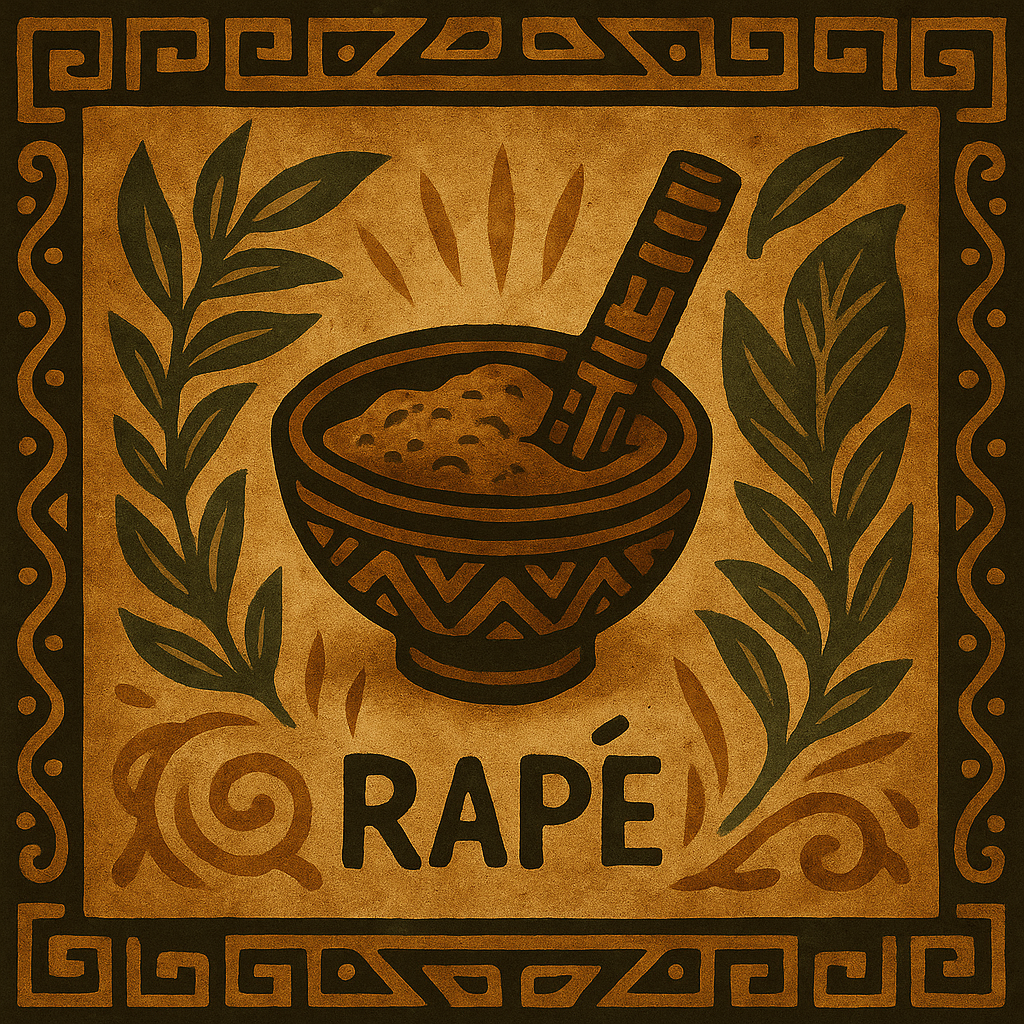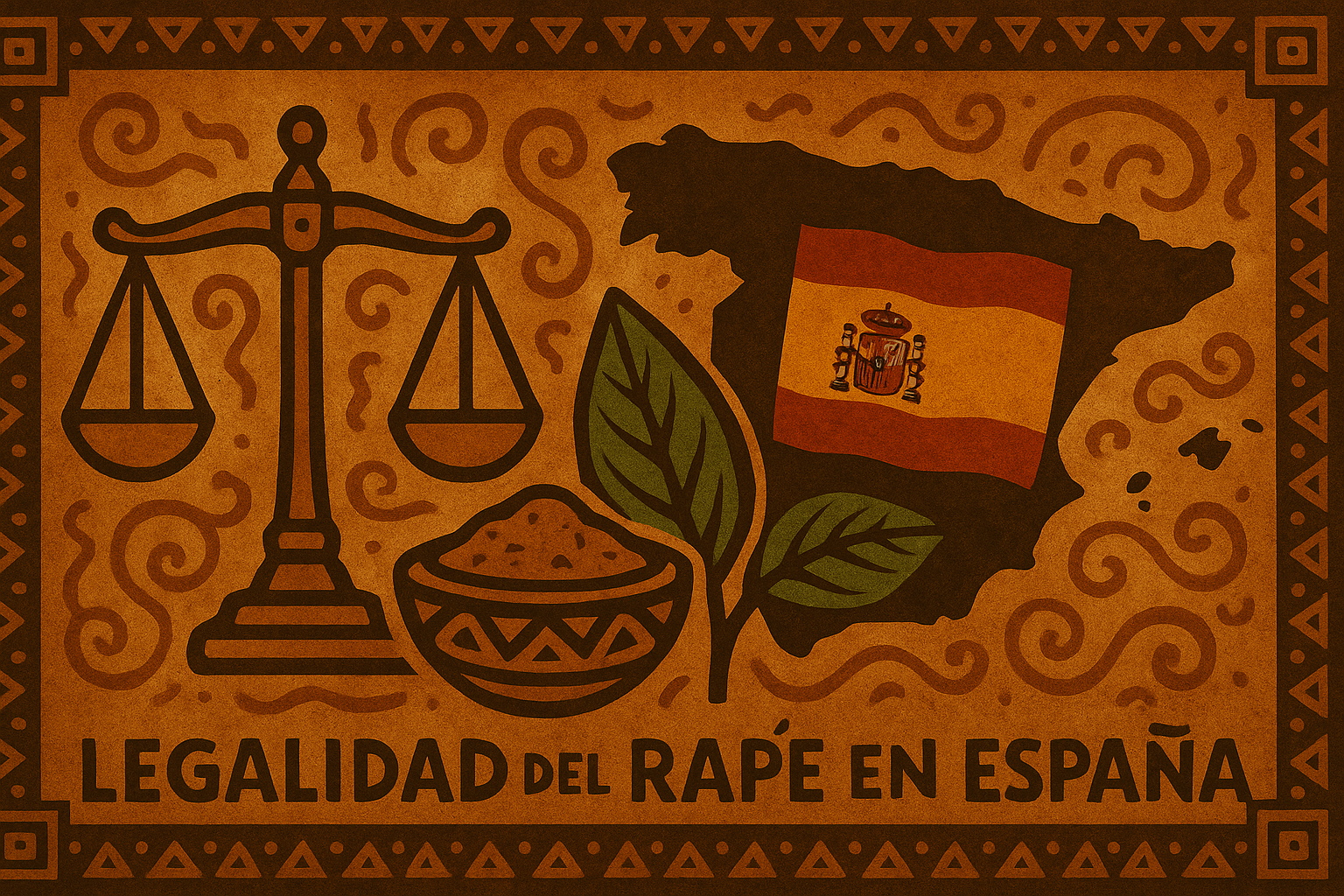Rapé is a sacred Amazonian snuff used for spiritual cleansing, grounding, and energetic alignment. But as it becomes more popular around the world, many people wonder:
Is rapé legal in my country? Can I use or buy rapé without risk? All abou Rapé legal status.
This guide explores the legal status of rapé, especially in Europe and the Americas, while honoring its indigenous roots and sacred use. Whether you’re a practitioner, healer, or curious explorer, this article will clarify your doubts with respect, precision, and depth.
1. What is rapé, and why does legality matter (Rapé legal status)?

Rapé (pronounced ha-PAY) is a shamanic snuff made from Nicotiana rustica (jungle tobacco) and sacred ashes of medicinal plants like Tsunu, Murici, Mulateiro or Jurema Preta.
It is not smoked or snorted—rapé is administered via a blow into each nostril using a kuripe or tepi, and is considered a medicine of the forest. It helps:
- Calm the mind 🧘
- Clear the energy field 🌬️
- Connect with spiritual guidance 👁️
But because it contains nicotine and is foreign to Western pharmacological systems, rapé often raises legal and regulatory questions.
2. Is rapé legal internationally?
Let’s start with a general overview:
✅ Rapé is not considered an illegal drug in most countries.
Unlike ayahuasca (which contains DMT) or San Pedro (mescaline), rapé does not produce visions or psychedelic effects. Therefore, it is not listed as a controlled substance under most national or international drug laws.
Still, there are important cultural, health, and importation nuances.
3. Rapé and the law in different regions
🇪🇸 Spain
- Legal status: ✅ Legal
- Rapé is not banned. It is sold online and in esoteric or spiritual stores.
- Shops label it as a ritual or ethnobotanical product, not as medicine or tobacco.
- It can be used for personal purposes in private settings.
⚖️ No medical claims or smoking recommendations should be made to comply with Spanish health regulations.
🇫🇷 France
- Legal status: ⚠️ Borderline
- Nicotine products are tightly regulated.
- Importing rapé may be questioned by customs, especially if not properly labeled.
- It is best to buy within the EU or consult customs regulations in advance.
🇬🇧 United Kingdom
- Legal status: ✅ Legal, but niche
- Rapé is not illegal, but must not be advertised as a health remedy.
- Customs may delay parcels from South America due to tobacco content.
🇺🇸 United States
- Legal status: ⚠️ Unregulated
- Rapé is not a controlled substance, but FDA may take action if:
- Sold with medical claims
- Containing unknown herbs
- Improperly labeled imports
📦 Tip: Buy from reputable US-based sellers who import legally.
🌐 Latin America
Ironically, in some Latin American countries outside the Amazon, rapé can face legal misunderstanding due to ignorance of its traditional use.
For example:
- Brazil: ✅ Legal and widespread in indigenous and spiritual circles
- Argentina: ⚠️ Legal, but customs may ask for documentation
- Chile & Colombia: Variable, better to consult local norms
4. Rapé and the WHO/FDA: is it a medicine?
This is one of the most delicate points. Rapé is not recognized as pharmacological medicine by the World Health Organization (WHO) or national health agencies.
Therefore:
- It cannot be sold as a therapeutic product in pharmacies.
- It should not be marketed as a cure for diseases.
- It is not certified as a supplement or drug.
This doesn’t make it illegal—but it does affect how it can be sold, imported, and advertised.
5. Ritual use vs. recreational use
The intention matters.
- When rapé is used in sacred context, with respect and discretion, it rarely raises concerns.
- When it is used publicly, in parties, or in a commercial way disconnected from tradition, it may be questioned.
🌿 Remember: rapé is not for getting high. It is for going deep.
6. Legal tips for buying rapé safely
Buying rapé legally depends not only on where you live but also on how and from whom you buy it. Here are some tips to stay within legal boundaries:
✅ Buy from trusted, ethical sources
- Look for websites or shops that state the origin of their blends (tribe, maker, region).
- Avoid vendors who make medical claims or promise healing from diseases.
- Prefer sellers who label their products as:
- Spiritual tool
- Ethnobotanical incense
- Shamanic ceremonial blend
🛒 Many legitimate stores also include the disclaimer: “Not for human consumption.” This protects both you and the seller under current laws.
🧾 Know how it’s labeled
If rapé is seized by customs, it’s usually due to incomplete labeling or confusion about the content.
Good labeling practices include:
- Full botanical names (e.g., Nicotiana rustica, Platycyamus regnellii)
- Country of origin
- Clear statement: “Not a drug / Not for smoking”
🌍 Prefer intra-EU shipping
If you’re based in Europe, it’s safest to buy from EU-based sellers who already passed customs clearance. This reduces risks and shipping delays.
If you import from Brazil, Peru, or Colombia, be prepared for:
- Longer delivery times
- Possibility of temporary retention
- Risk of product loss if regulations aren’t followed
7. Legal differences with other plant medicines
Many confuse rapé with visionary plants like ayahuasca or peyote. It’s crucial to differentiate them:
| Plant medicine | Legal status | Contains psychedelics? | Comments |
|---|---|---|---|
| Rapé | ✅ Mostly legal | ❌ No | Not listed as controlled substance |
| Ayahuasca | ❌ Illegal in many places | ✅ Yes (DMT) | Controlled due to DMT content |
| Sananga | ✅ Legal (mostly) | ❌ No | Eye drops, not controlled |
| Kambó | ⚠️ Grey zone | ❌ No | Gaining attention of health regulators |
| Jurema (Mimosa) | ⚠️ Variable | ✅ Yes (DMT) | Root bark legal, extracts problematic |
⚖️ Rapé stands apart for being non-psychoactive, yet spiritually powerful.
8. Is rapé recognized as medicine?
From a legal point of view, rapé is not a medicine. But from a spiritual perspective, it absolutely is.
That’s why users must walk the line between:
- ✨ Respecting the sacredness of rapé as ancestral medicine
- 🛡️ Complying with the laws of their country to avoid conflict
Until international laws recognize indigenous medicines with nuance, we must remain guardians of tradition and discretion.
9. Practicing responsibly: Law and lineage
Using rapé in alignment with legal and spiritual principles means:
- Creating ritual space when you receive it 🙏
- Understanding the lineage and tribes behind each blend 🌱
- Not using rapé as trend, entertainment, or rebellion ❌
- Avoiding social media exposure or commercial exploitation 📵
🌀 The legality of rapé depends not just on the law… but on your relationship with the spirit of the forest.
🌿 Join the Sacred Rapé Tribe

We’ve opened an intimate group on Telegram for souls who honor this medicine with respect and purpose. Share rituals, spiritual guidance, and sacred energy in community.
You just need to leave your email to receive access. 🌕 See you within the circle!
Conclusion: A sacred right in modern times
The fact that rapé is legal in most parts of the world is a blessing and a responsibility.
It allows us to access a sacred tool of healing and alignment. But it also demands maturity, discernment, and gratitude.
Every puff of rapé is a prayer.
Every ceremony is a doorway.
Every user is a guardian of something ancient.
🌿 May your path with rapé be legal in the eyes of the law and sacred in the eyes of the forest.

